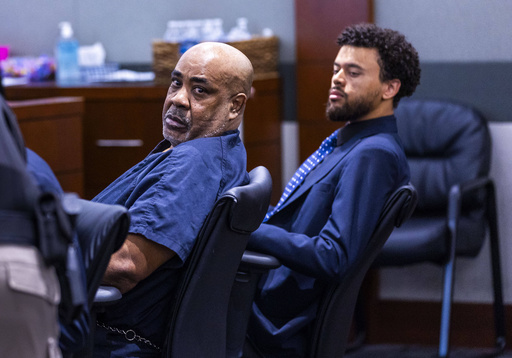LAS VEGAS — Duane “Keffe D” Davis, who is facing charges in the 1996 murder of renowned rapper Tupac Shakur, recently faced a setback in his efforts to secure a new trial in an unrelated battery case stemming from a prison altercation. The decision, announced on Wednesday, followed an intense courtroom session in Las Vegas that highlighted the prominence of Davis’s legal battle and its connection to one of hip-hop’s most notorious cases.
In the courtroom, the jurors who had found Davis guilty of battery during the jail dispute were called to testify. They were asked to address allegations made by Davis’s son and a man claiming to be a journalist, who both said they overheard a juror discussing the case during a lunch break before deliberations began.
The accounts given by Davis’s son, Duane Davis Jr., and the self-proclaimed journalist, Richard Bond, took place in front of the judge. They claimed to have heard the juror’s comments just outside the courtroom on the last day of the two-day trial in April. However, Clark County District Judge Nadia Krall pointed out potential biases and motives for the testimonies due to the personal connections between Davis’s supporters. She noted that the two witnesses had a friendship and that Bond had financially assisted both Davis and his son while advising them to dismiss their attorney, Carl Arnold.
When asked by prosecutor Marc DiGiacomo about his qualifications in journalism ethics, Bond acknowledged he has not formally studied journalistic integrity. The confrontation that resulted in the battery charge occurred in December 2024, and was captured on security footage. The footage showed Davis exchanging words with another prisoner before engaging in a physical altercation. Arnold, Davis’s lawyer, argued that his client was caught off guard and only acted in self-defense.
Following the court appearance, DiGiacomo, who is also prosecuting the high-profile Tupac Shakur case, refrained from commenting on the situation. Representatives for Arnold also chose not to comment. During courtroom proceedings, Arnold argued that the comments from the juror negatively impacted Davis’s case and denied him a fair trial. Yet, the juror strongly refuted the accusations on multiple occasions.
This was not the first occasion where the legitimacy of Davis’s associates came into question in the legal process. Davis remains the sole individual charged in connection with Shakur’s shooting. After his arrest in September 2023, he attempted to gain release from custody, but a judge maintained skepticism over the origins of the funds intended for his bond.
During these proceedings, a music industry executive showed willingness to fund Davis’s $750,000 bail, claiming the money was acquired legally, partly motivated by Davis’s positive reputation in the community. However, the judge remained dubious after receiving documents purported to support the bail funding which contained errors, and inconsistencies regarding origins, suggesting possible fraud.
While Davis pled not guilty to first-degree murder charges, he stands accused of orchestrating the fatal drive-by shooting of Shakur nearly three decades ago near the Las Vegas Strip. Prosecutors have built a strong case against Davis, with considerable evidence including his own past interviews and a tell-all memoir published in 2019. His trial, involving the murder of the iconic rapper, is slated for February.
Tupac Shakur, who remains an enduring figure in the world of music, died at the age of 25, while his fourth album, “All Eyez on Me,” was still achieving major commercial success. The album had already sold around 5 million copies. Having been nominated for six Grammy Awards, Shakur is celebrated as one of the most versatile and impactful rappers in music history.


